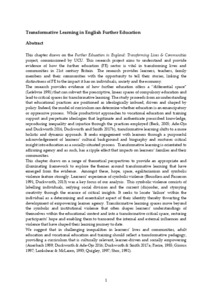Smith, Rob and Duckworth, Vicky
(2019)
Transformative Learning in English Further Education.
In:
Handbook of Vocational Education and Training.
Springer.
ISBN 9783319497891
![[img]](/6801/1.hassmallThumbnailVersion/Transformative%20Learning%20in%20English%20Further%20Education.pdf)  Preview |
|
Text
Transformative Learning in English Further Education.pdf
- Accepted Version
Download (394kB)
|
Abstract
This chapter draws on the Further Education in England: Transforming Lives & Communities project, commissioned by UCU. The study aims to understand and provide evidence of how the further education (FE) sector is vital in transforming lives and communities in 21st century Britain. The research provides learners, teachers, family members and their communities with the opportunity to tell their stories, linking the distinctness of FE to the impact it has on individuals, society and the economy.
The study provides evidence for how further education offers a “differential space” (Lefebvre 1992) that can subvert the prescriptive, linear spaces of compulsory education and lead to transformative learning. The study exposes educational practices as ideologically imbued, driven and shaped by policy. The model of curriculum can determine whether education is an emancipatory or oppressive process. While productivist approaches to VET support and perpetuate ideologies that legitimate and authenticate prescribed knowledge, reproducing inequality and injustice through the practices employed (Beck, 2005; McLaren, 1988; Duckworth 2013. Ade-Ojo and Duckworth 2016, Duckworth and Smith 2017), transformative learning tends to adopt a holistic approach. It seeks engagement with learners through a purposeful acknowledgement with learners’ cultural background and biography and nurtures critical insight into education as a socially situated process. Transformative learning is orientated to affirming agency and as such, has a ripple effect that impacts on learners’ families and the communities they come from.
Bourdieu’s work offers an appropriate and illuminating theoretical frame to explore the theme of capital / or lack of capital that emerged strongly from participant accounts. Their experience of symbolic violence is a central focus of our analysis. The symbolic and institutional violence that shaped the students' understandings of themselves within the educational context and the creation of a transformative critical provided a space which enabled the participants to explore and transcend the internal and external influences and violence that shaped their learning journey.
This symbolic violence consists of labelling individuals, reifying social division and the current (dis)order, and stymying creativity through a denial of critical insights. It seeks to locate ‘failure’ within the individual as a determining and essentialist aspect of their identity of thwarting the development of empowering learner identities,
We suggest that in challenging inequalities in learners’ lives and communities, adult education should reflect a transformative pedagogy, providing a curriculum that is culturally relevant, learner driven, and socially empowering (Auerbach, 1989; Freire, 1993; Lankshear & McLaren, 1993; Quigley, 1997; Shor, 1992, Giroux 1997; Lankshear and McClaren 1992; Duckworth & Ade-Ojo 2016; Duckworth & Smith 2017).
Actions (login required)
 |
View Item |

 Tools
Tools Tools
Tools